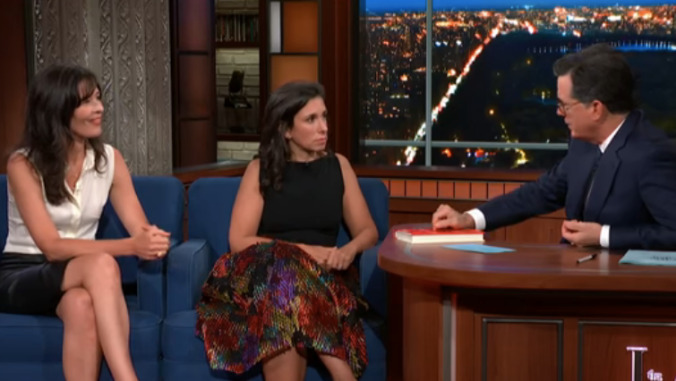The Pulitzer Prize-winning authors of She Said assess #MeToo after Weinstein on The Late Show

New York Times journalists Jodi Kantor and Megan Twohey told Stephen Colbert about the time that an enraged Harvey Weinstein finally barreled right into the NYT offices, toting folders of “material to smear his accusers.” That’s after the now-disgraced movie mogul had already hired ex-Mossad agent private investigators to “put a stop” to the reporters’ efforts, and threatened to file a massive lawsuit against them and the paper, all tactics that, as Kantor and Twohey’s work on the culture of workplace sexual harassment (and worse) uncovered, had served the bullying Weinstein ably in the past. But that was then, as Colbert interviewed two of the women who helped bring down one of the most powerful sexual predators in show business, and whose quest to get the Weinstein story right helped sear the societal ills behind what had already become known as the #MeToo movement into the national consciousness, inescapably.
The reporting duo were there to promote She Said, their book about not just the Weinstein saga and its resultant fallout, but how #MeToo has changed the national discourse about sexual harassment and assault—and how it most definitely hasn’t. “When your mother says she loves you, check it out,” was the newsroom adage Twohey said guides her approach to what often comes down to the “he said-she said” nature of accusations that harassers count on so dearly, adding that their job when investigating the deluge of accusations of sexual misconduct that has come crashing down post-Weinstein is to undertake the “rigorous process of corroboration” any real journalist relies upon. (Just a heads-up to Fox News there.) To Colbert raising the specter of those (men, mostly) who feel that #MeToo has “gone too far,” Kantor admitted that there is “a mounting sense of unfairness on both sides” about a system that no one thinks “works for the accuser, or the accused.” Their job remains, as Kantor put it, to ask the three main questions surrounding any allegation: “What is the scope of the behaviors under scrutiny?;” “How do we get the facts right?;” and “What should punishment and accountability look like?”
“And the answer to all three are?,” asked Colbert wryly, underlining just how hard the reporters’ job remains, before bringing up the GOP elephant in the room by asking why Donald Trump—credibly accused 17 times of everything from sexual impropriety to rape—remains seemingly untouched, even in the #MeToo era. Twohey, who’s been covering accusations against Trump from the 2016 campaign right up until author E. Jean Carroll’s 2019 allegation that Trump raped her in a department store fitting room in 1996, said that, when the accused is a political figure, the conversation will “quickly descend into holy war—the women are forgotten.” Colbert speculated that, for people who see their faith in a particular candidate as a “part of their identity,” an accusation of sexual misconduct comes uncomfortably close. (Colbert, indeed, has had to confront being publicly linked to an alleged world-class sex creep in CBS boss Les Moonves, although he didn’t bring it up in the interview.)
For Twohey and Kantor, who won the 2018 Pulitzer Prize for Public Service for their part in the Times’ Weinstein coverage, their book is a way to fill out their reporting, Kantor noting that many of their off-the-record sources could be more candid now that Weinstein has gone down. Also, the journalists explained that the book expands their investigations to cover other outed (alleged) sexual harassers, assaulters, and outright underage sex-ring operators like now Supreme Court judge Brett Kavanaugh, and pedophile pal to the rich and famous, the suspiciously late Jeffrey Epstein. As to Colbert’s question of what they’ve learned—and if it’s somehow better now for women, even a little bit—Kantor only answered that there’s a serious sense of déjà vu, and that the Weinstein and Epstein cases that bookend their book both go to show that there is an entrenched “veneer of privilege” that still operates to “hide something very rotten.”
She Said is available for sale now.